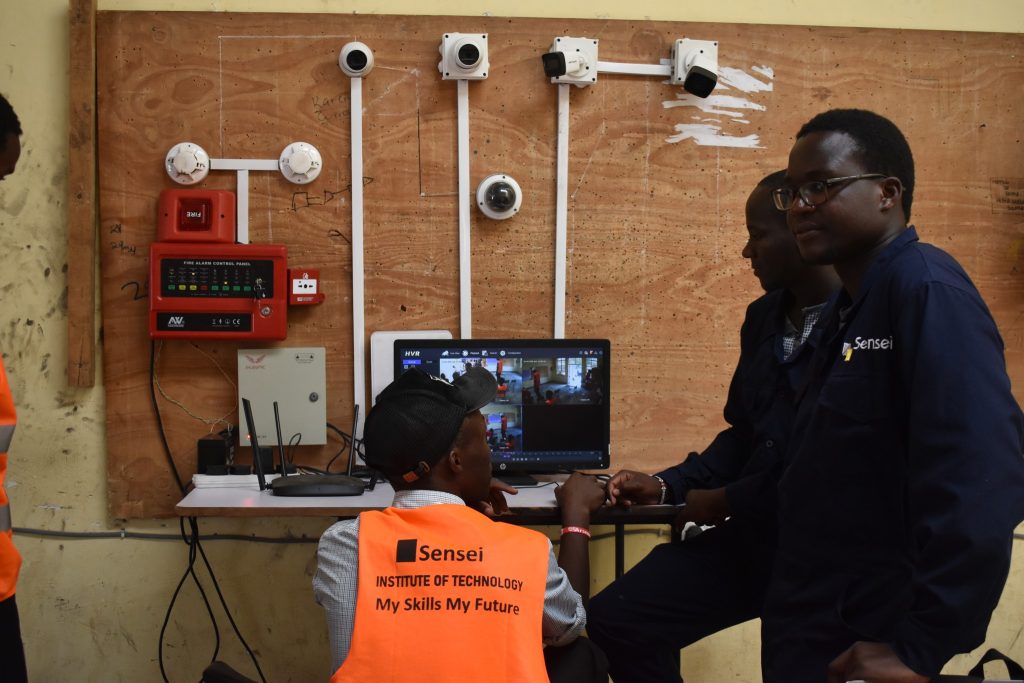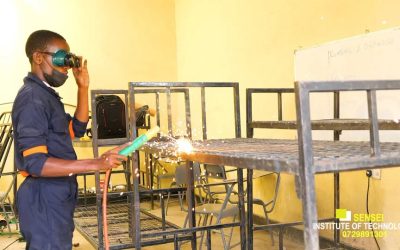Understanding CCTV Cameras in Kenya: A Comprehensive Guide

CCTV cameras in Kenya have transformed from luxury equipment into an essential part of homes, businesses, and public spaces across Kenya. Whether you want to protect your home in Nairobi, monitor your business in Mombasa, or secure an institution in Nakuru, understanding how CCTV systems work — and where to get proper training — is key.
What Does CCTV Stand For?
CCTV stands for Closed-Circuit Television.
It’s called “closed-circuit” because the signal is transmitted to a limited set of monitors or devices — not broadcast publicly. Unlike traditional television, where signals are open to anyone, CCTV systems send footage only to specific screens or devices for private viewing.
This makes CCTV ideal for monitoring, recording, and enhancing security in both residential and commercial environments.
The Rise of CCTV Use in Kenya
In the past decade, Kenya has seen a sharp rise in the use of CCTV cameras — driven by:
- Urban insecurity and rising burglary rates
- Government safety regulations in urban centers
- Affordable technology and better access to digital systems
- Smartphone integration, allowing remote viewing and alerts
- Insurance and compliance requirements for businesses
Today, you’ll find CCTV cameras in schools, banks, Saccos, offices, estates, apartments, and even matatus.
How Much Does It Cost to Install CCTV Cameras in Kenya?
CCTV installation costs depend on the type of system, number of cameras, and quality of equipment.
Here’s a general breakdown of CCTV installation costs in Kenya (2025 estimates):
| System Type | Typical Setup | Estimated Cost (KSh) |
|---|---|---|
| 2-Camera Analog System | Small home/office | 15,000 – 30,000 |
| 4-Camera IP System | Medium home/business | 35,000 – 60,000 |
| 8-Camera HD System | Large home or shop | 75,000 – 120,000 |
| 16-Camera Commercial System | Office complex / school | 150,000 – 250,000+ |
| Wireless Smart CCTV System | Remote access (WiFi) | 30,000 – 80,000 |
Always choose professional installers to ensure proper coverage, wiring, and storage configuration. Poor setup can reduce camera performance and coverage.
Types of CCTV Cameras in Kenya
CCTV technology has evolved, and there are several camera types — each designed for different needs. Below are the main types of CCTV cameras you’ll encounter in Kenya:
1. Dome Cameras
- Used indoors; discreet and vandal-resistant.
- Ideal for shops, offices, and lobbies.
2. Bullet Cameras
- Long, cylindrical shape for outdoor use.
- High visibility acts as a deterrent.
3. PTZ (Pan-Tilt-Zoom) Cameras
- Can rotate, tilt, and zoom for wide coverage.
- Often used in malls, parking areas, and city surveillance.
4. Infrared/Night Vision Cameras
- Work well in darkness using IR LEDs.
- Perfect for 24-hour monitoring.
5. IP (Network) Cameras
- Send digital footage over a network.
- Allow remote access via smartphone or computer.
6. Wireless Cameras
- No cables; connect via Wi-Fi.
- Easy to install but depend on strong connectivity.
7. Hidden (Spy) Cameras
- Disguised for discreet monitoring.
- Common in investigations or sensitive environments.
8. Thermal Cameras
- Detect heat signatures; used in industrial or high-security sites.
Types of CCTV Systems
CCTV systems can also be classified by technology and storage method:
- Analog CCTV Systems – Record video using coaxial cables and DVRs.
- HD CCTV Systems – Offer higher image resolution using analog transmission.
- IP CCTV Systems – Use digital networking (NVRs) and are ideal for large-scale or remote monitoring.
- Hybrid Systems – Combine analog and IP setups for flexibility.
CCTV vs Security Cameras — What’s the Difference?
While many use the terms interchangeably, there’s a slight distinction:
| Aspect | CCTV Cameras | Security Cameras |
|---|---|---|
| Signal | Closed system (private) | Can be cloud- or internet-based |
| Usage | Continuous monitoring & recording | Broader, includes doorbell cams, Wi-Fi cams |
| Connectivity | Local DVR/NVR | Often connected to cloud or mobile app |
| Scope | Professional surveillance | Personal/DIY security |
So, all CCTV cameras are security cameras — but not all security cameras are CCTV systems.
CCTV Laws and Privacy in Kenya
CCTV installation is legal in Kenya, but it must respect the Data Protection Act (2019).
Here’s what you should know:
- You must inform people that CCTV is in operation (use visible signage).
- Recorded footage cannot be shared publicly without consent.
- Installers should ensure data is securely stored and used for lawful purposes.
- For businesses, compliance with the Office of the Data Protection Commissioner (ODPC) is recommended.
Violating privacy laws can lead to penalties or prosecution.
How to Choose the Right CCTV System
When choosing a CCTV system in Kenya, consider:
- Purpose – Home, office, business, or institution?
- Location – Indoor or outdoor environment?
- Lighting conditions – Day/night performance.
- Storage – DVR, NVR, or cloud?
- Scalability – Will you add more cameras later?
- Budget – Balance cost and quality.
Steps in CCTV Installation
- Site Survey – Identify key areas and angles for maximum coverage.
- System Design – Choose camera types and storage systems.
- Wiring and Mounting – Set up cables, power supply, and mounts.
- Configuration – Connect DVR/NVR and test live feeds.
- Remote Access Setup – Integrate mobile or web viewing.
- Testing & Maintenance – Regularly check recording quality and camera health.
Best College to Train in CCTV Installation in Kenya
Sensei Institute of Technology – The Leader in Hands-on CCTV Training
If you want to become a professional CCTV installer, look no further than Sensei Institute of Technology.
Why Sensei?
- ✅ Practical, hands-on CCTV installation training
- ✅ Courses cover both analog and IP camera systems
- ✅ Certified trainers and up-to-date equipment
- ✅ Recognized by TVET and leading technical authorities
- ✅ Affordable fees (around KSh 25,000 for full course)
- ✅ Campuses in Nakuru and Kitengela
- ✅ Offers job linkages and entrepreneurship mentorship
Course Content Includes:
- Basics of electrical and electronics
- CCTV wiring, setup, and camera configuration
- DVR/NVR installation
- Network setup and remote access
- Troubleshooting and maintenance
Sensei Institute also provides short courses in solar installation, automotive mechanics, plumbing, and electricals, making it an ideal choice for anyone looking to join Kenya’s booming technical workforce.
Visit Sensei Institute of Technology to enroll or learn more.
Final Thoughts
CCTV cameras are no longer a luxury — they are a necessity for modern security in Kenya. Whether you’re protecting your property or pursuing a career in installation, understanding how CCTV works and choosing the right system can make all the difference.
If you’re passionate about security systems and want to master CCTV installation, Sensei Institute of Technology offers the best training to help you build a rewarding and marketable skill in Kenya’s growing security industry.






